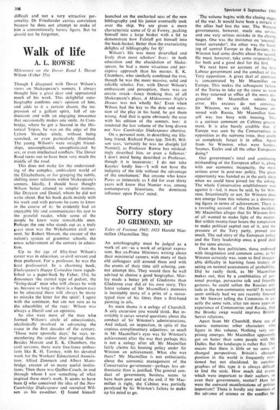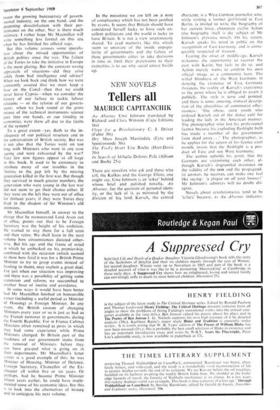Sorry story
JO GRIMOND, MP
Tides of Fortune 1945: 1955 Harold Mac- millan (Macmillan 70s) An autobiography must be judged as a work of art—as a work of original expres- sion. But ex-Prime Ministers writing about their ministerial careers, with many of their old colleagues still around them and with the events of their time still echoing, can- not attempt this. They would then be well advised to choose a good biographer. Mor- ley made a better job of Gladstone than Gladstone ever did of his own story. This latest volume of Mr Macmillan's memoirs is inevitably more of a print of a stereo- typed view of his times than a first-hand painting in oils.
Its main theme is a eulogy of Churchill. A safe excursion you would think. But in- evitably it raises several questions about the conduct of Sir Winston's administrations. And indeed, on inspection, in spite of the copious complimentary adjectives, so small in Mr Macmillan's eyes was Sir Winston's achievement after the war that perhaps this is not a eulogy after all. Mr Macmillan fairly claims his housing policy under Sir Winston an achievement. What else was there? Mr Macmillan is not enthusiastic about the economic management of the Conservative government—perhaps less en- thusiastic than is justified. The general con- duct of government business seems to have been poor and at the end, if Mr Mac- millan is right, the Cabinet was partially paralysed by Sir Winston's failure to make up his mind to go. The volume begins with the closing stages of the war. It would have been a miracle if the allies had lost the war. The Western governments, however, made one serious and one very serious mistake in the closing Pages. One was the insistence on 'uncondi- tional surrender'; the other was the hand- ing of central Europe to the Russians. Sir Winston had some doubts about the second. He must, however, take some responsibility for both and a good deal for the first.
We next have an account of the first Labour government and the conduct of the Tory opposition. A great deal of attention is' concentrated by Mr Macmillan on Europe. This makes the subsequent failure
of the Tories to take up the cause as soon as they returned to office all the more dis-
graceful. Mr Macmillan admits the error. His excuses do not convince. Sir Winston, we are told, became ob- sessed with Russia. Mr Macmillan him- self was too busy with housing. This is a curious comment on Cabinet govern- ment. It is also barely credible that. if Europe was seen by the Conservatives in opposition as the supreme issue, they could so completely forget it in office. Apart from Sir Winston, what were Sandy,. Soames, Eccles and all the other Europeans doing?
Our government's total and continuing mishandling of the European affair is, along with our economic incapacity, the most
serious error in post-war policy. The great opportunity was handed us in the early days
when we could have joined for the asking.
The whole Conservative establishment was against it—led, it must be said, by Sir Win- ston. Intentionally or not, Sir Winston does not emerge from this volume as a dominat- ing figure in terms of achievement. There is
a revealing account of the Dalton incident.
Mr Macmillan alleges that Sir Winston first of all wanted to make light of the matter.
But within twenty-four hours the temptation to make political capital out of it, and the pressure of the Tory party, proved too much. The sad story of the European policy and the Tory leadership owes a good deal to the same sources.
Even the best politicians, those endowed with imagination and common sense, as Sir Winston certainly was, seem to find insuper- able difficulty in learning from history or acting on normal assessments of probability.
Did he really think, as Mr Macmillan
makes out, that by a combination of per- sonal prestige, persuasive talk and friendly
gestures, he could soften the Russian atti- tude to the non-communist world? It would seem unlikely had we not recently listened
to Mr Stewart telling the Commons in ex- actly the same vein, after ten more years of experience of Communism and Russia, that the Brooke swap would improve British- Soviet relations.
Apart from Mr Churchill, there are of course numerous other characters who figure in this volume. Nothing very sur-
prising emerges. Mr Macmillan apparently got on better than some people with Mr Dulles. But the landscape is rather flat. This
means that there is little or no sense of changed perspectives. Britain's changed position in the world is frequently men- tioned but not elucidated. In autobio- graphies of this type it is always difficult find the scale. How much did events which were important to their authors. or even their governments, matter? How far were the outward manifestations of politics important? There is hardly any mention of the advance of science or the conflict be-
tween the growing bureaucracy of govern- mental industry, on the one hand, and the deepening dissatisfaction with their per- formance on the other. Nor is there much intimacy. I rather hope Mr Macmillan will write something less formal on this era when he has finished his official saga.
But this volume arouses some specula- tion about the missed opportunities of British politics since the war. The failure of the Tories to take the initiative in Europe is the most glaring. But the constant wrong appraisals of situations—did they arise solely from bad intelligence and advice? When we look back and think how we were constantly assured that we must keep a base on the Canal—then that we could never leave Cyprus—when we consider the history of our failure to tackle labour relations — or the reform of our govern- ment: when we look round at the gross misuse of the technical instruments science puts into our hands, or our timidity in economics, were these all due to the faults of the system?
To a great extent—yes. Both to the in- adequacy of our political structure and to the conservatism of British society. But was it not also that the Tories went on too long with Ministers who were in any case ageing and were exhausted by the war? Very few new figures appear at all large in this book. It used to be customary to attribute many of our troubles in the 'thirties to the gap left by the missing generation killed in the first war. But though they survived in much greater numbers, the generation who were young in the last war did not seem to get their chance either. If they were on the left they were out of office for thirteen years; if they were Tories they lived in the shadow of Sir Winston's old intimates.
Mr Macmillan himself, in answer to the charge that he manoeuvred Lord Avon out of office, points out that to be Foreign Secretary was the height of his ambition. He wanted to stay there for a full term and then retire. We shall learn in the next volume how circumstances dictated other- wise. But his age and the frame of mind in which he embarked on his premiership, combined with the occasion (which seemed to show how fatal it was for a British Prime Minister to try to grasp events instead of bending to them), may explain a great deal For just when our situation was improving and there was a possibility of getting some expansion and reform, we succumbed to another bout of inertia and avoidance.
In some ways it would have been better had Mr Macmillan finished an honourable career (including a useful period as Minister of Housing) as Foreign Minister. In any event, the British custom of changing Ministers every year or so is just as bad as the French turnover in governments during the Fourth Republic. For in France Cabinet Ministers often remained at posts in which they had some experience while Prime Ministers changed. In Britain part of the weakness of our government stems from the removal of Ministers before they can have grasped what is going on in their departments. Mr Macmillan's latter career is a good example of this; he was Minister of Housing, Minister of Defence, Foreign Secretary, Chancellor of the Ex- chequer all within five or six years. Or perhaps, had he become Prime Minister fifteen years earlier, he could have imple- mented some of his economic ideas. But this is to look into the alternatives of history and to anticipate his next volume. in the meantime we are left on a note of complacency which has not been justified by events. It seems that Britain should have considered herself lucky to have such ex- cellent politicians and the world is lucky to have Britain. It is not a view unanimously shared. To read memoirs like this which seem so unaware of the inside unpopu- larity of governments and the failure of these governments either to take decisions in time or limit their pretensions to their capacities, is to see why social unrest builds up.



































 Previous page
Previous page